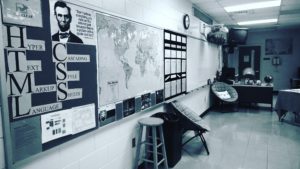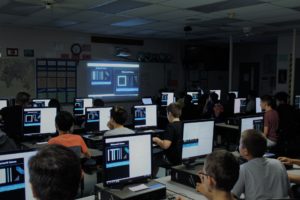 You are the students of a Pre-Engineering Magnet School. You have been given the opportunity to learn skills that only 10 percent of K-12 schools are teaching across the nation. But having an opportunity does not automatically make you successful. Success depends on two things:
You are the students of a Pre-Engineering Magnet School. You have been given the opportunity to learn skills that only 10 percent of K-12 schools are teaching across the nation. But having an opportunity does not automatically make you successful. Success depends on two things:
- The quality of your learning environment (classroom, teacher, lessons, resources).
- Your willingness to learn (respect, discuss, practice, experiment, work).
In order to learn, you have to know, with confidence, that the room you are in is secure. You have to know, with confidence, that any people who share that room with you are safe. That means everyone has to get on the same page and agree to the same code of conduct. That means the teacher has to set the tone and agree to uphold that code of conduct.
- You can move freely around the room when you need to stretch, get a snack, or grab a drink. You are in a safe space.
- You can use the restroom with a pass as needed without asking permission. You will be trusted.
- You can ask questions and express concerns about safety issues in class or around campus. You are encouraged to talk.
- You cannot use your freedom to cause harm or offense to another person in the room. You will damage that safe space.
- You cannot use the restroom for longer than four minutes or in excess without permission. You will lose trust.
- You cannot express yourself through shouting or disrupting the learning environment. That makes people feel uneasy.
 Everything in the room belongs to someone. The computers, the keyboards, the chairs, and the tables belong to the school. The posters, the maps, and the music belong to the teacher. The backpacks, the phones, and the earbuds that come into the classroom from outside belong to the students. Again, everyone owns something, but in order to maintain that sense of safety and security, there has to be an agreement between all members of the room about how all those things will be treated.
Everything in the room belongs to someone. The computers, the keyboards, the chairs, and the tables belong to the school. The posters, the maps, and the music belong to the teacher. The backpacks, the phones, and the earbuds that come into the classroom from outside belong to the students. Again, everyone owns something, but in order to maintain that sense of safety and security, there has to be an agreement between all members of the room about how all those things will be treated.
The teacher, the school, and the district are all supportive of technology for advancing your success as a student. But that does not mean that technology is a free-for-all where anything goes. Technology can be useful for improving lives and it can also be used to cause damage. Over the period of time that you go through K12 Digital Courses, you will learn how best to function as digital citizens using technology for the better, not for the worse.
- You can use the computers, the chairs, and the tables you were assigned to use for lessons and class-related work.
- You can read the posters, talk about the maps, and enjoy the music the teacher has provided for the classroom.
- You can listen to your own music on your own devices if you have been given an assignment that is independent of class activities.
- You can use your personal phone to take pictures, save information, and look things up as the teacher permits for various reasons during class time.
- You cannot take over someone else’s computer space without their permission, bang on the keyboards and the mouse, or go up and down in the chairs. None of these things are toys.
- You cannot eat, drink, or chew gum near a computer workstation. Crumbs can scatter, drinks can spill, and gum is sticky. These are old computers and must be taken care of.
- You cannot rip, mark on, or tamper with the things that belong to the teacher. None of these things belong to you.
- You cannot listen to your own music in the middle of class, not even with one ear. Distraction will not help you learn.
- You cannot text or use social media in the middle of class, not once. Or all students will deposit their phones in a crate that goes into the closet.
 Once you know that the room you are in and the people you are with are both here to keep you safe and secure, once you know that you have all the digital resources necessary to succeed and that those resources will be taken care of by all those who share them, the question is how you will actually succeed. The question is what will take you from just being a student who shows up to being a student who succeeds. And the answer is in how you treat and how you work with the other members of your classroom environment.
Once you know that the room you are in and the people you are with are both here to keep you safe and secure, once you know that you have all the digital resources necessary to succeed and that those resources will be taken care of by all those who share them, the question is how you will actually succeed. The question is what will take you from just being a student who shows up to being a student who succeeds. And the answer is in how you treat and how you work with the other members of your classroom environment.
In a computer classroom, where teachers and students all come from a wide range of backgrounds and experiences, success depends on members of that class working together. An attribute of good character known as cooperation. Teachers must respect the students. Students must respect the teacher. And students must respect each other. All of this is called mutual respect because it goes in both directions. Teacher to student. Student to teacher. And student to student.
- You can speak up for yourself if the teacher or a student is being disrespectful to you. You have a right to be heard.
- You can ask your partner or other members of your team for help when you are not sure what to do. More than one person can help.
- You can be patient, encouraging, gracious, and supportive with your partner, your team, your classmates, and your teacher.
- You can listen when other people are talking, including any time when someone starts talking over the loudspeaker.
- You can reset your workstation by flipping your name card, logging off, turning off your screen, and pushing in your chair.
- You cannot cry wolf. Claiming that someone pushed you or disrespected you when you were the instigator is misleading.
- You cannot ask for teacher help if you have not tried to work with your partner or team. This goes back to respect and cooperation.
- You cannot be impatient (“You’re too slow”), discouraging (“You’re a moron”), ungracious (“You’re not good enough”), or unsupportive (“I don’t want to help you”) with your partner, your team, or your classmates. That would go against everything the class is about.
- You cannot ignore people who talk to you, talk over people who need you to listen, or continue discussions when someone begins talking over the loudspeaker.
- You cannot leave your workstation without resetting. This is disrespectful to the next class of students who will enter the room.